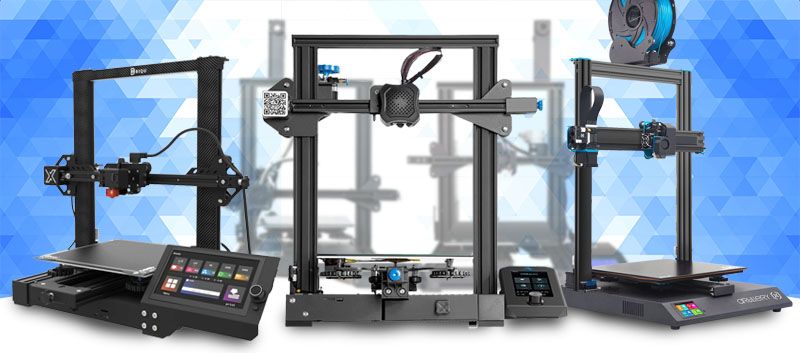5 cheap 3D printers for beginners
Beginner-friendly 3D printers under 500 euros
Are you looking for a cheap 3D printer for beginners?
We'll show you 5 beginner-friendly and inexpensive FDM printers under 500 euros, which we can warmly recommend for your entry into 3D printing.
Our criteria for beginner-friendly 3D printers
There are now a large number of cheap 3D printers for private use. Inexpensive devices are available from around 200 euros and are usually ready for immediate use. For us, in addition to a reasonable price, other factors are also decisive, based on which we have selected our top 5:
- Price under 500 euros
- Easy assembly
- User-friendliness
- Decent documentation / understandable user manual
- Good print quality
If you would like general information about what to look for when buying a 3D printer and how different devices differ, you can find our comprehensive guide for 3D printing beginners here.
1. Creality Ender V2 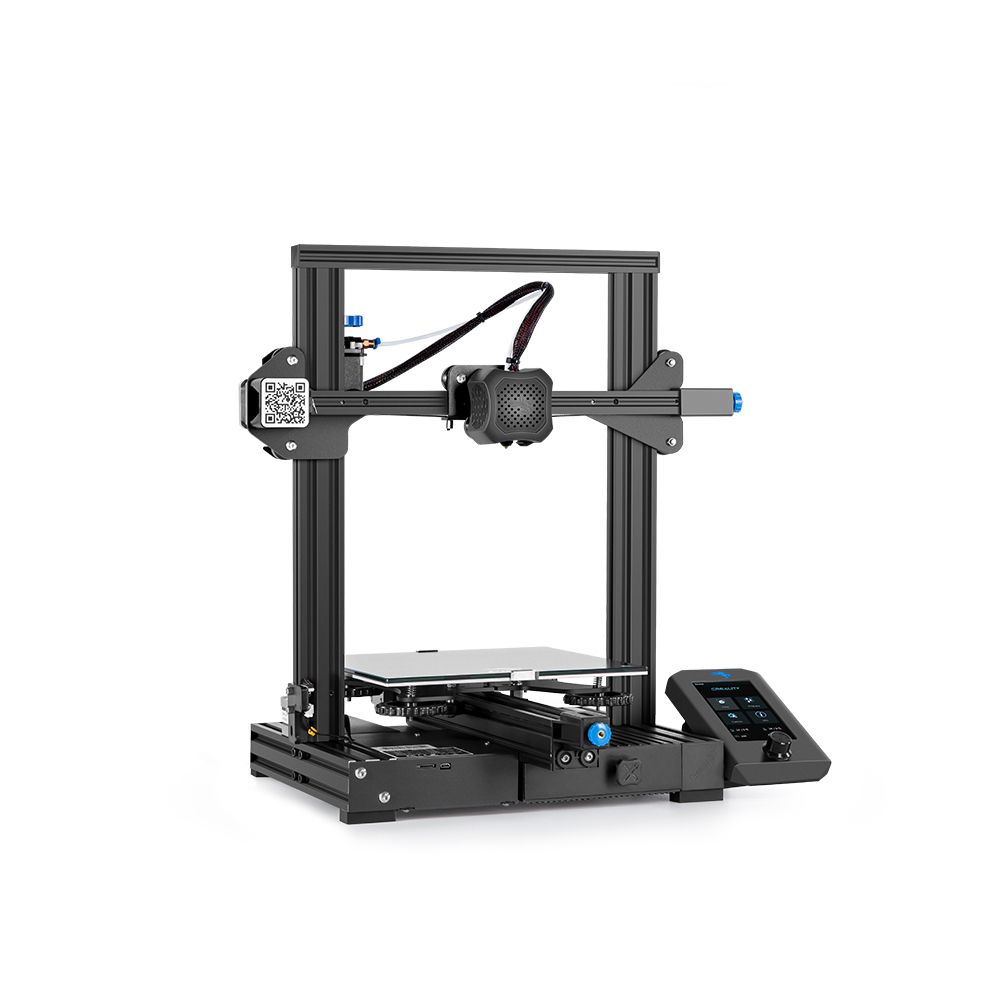
The Creality Ender V2 is a solid entry-level model with attractive features and great performance at a relatively low price. As the successor to the legendary Ender 3, the Ender V2 has been completely upgraded and improved.
Thanks to its modular design, the 3D printer is quick and easy to set up, even for beginners. A power supply unit hidden in the device ensures a tidy appearance and also increases safety.
Large build space | Bowden extruder | Carborundum glass plate
The Ender 3 V2 has a 220 x 220 x 250 mm build space, which is absolutely sufficient for getting started with 3D printing, and a hotend that is fed by a Bowden extruder. A rotary knob on the extruder makes it easy to refill new filament. The heated build platform is made of carborundum glass, which guarantees excellent adhesion and heats up quickly.
The maximum nozzle temperature is 255 ° C, the maximum heating bed temperature is 100 ° C.
Resume Print Function | TMC2208 Stepper Driver | Colour display
The 3D printer is equipped with the Resume Print function, which ensures that the printing process can be continued without problems after a power failure.
A specially developed motherboard with TMC2208 stepper drivers ensures smooth movement and low noise of less than 50 dB during printing.
The printing status can also be monitored on a large colour display.
Features of the Creality Ender 3 V2 at a glance
- Pre-assembled
- 220 x 220 x 250 mm installation space
- Bowden extruder
- Single extruder
- Max. nozzle temperature: 255 ºC
- Max. Heating bed temperature: 100 ℃
- Heated carborundum glass platform
- Resume print function
- Detachable colour LCD display
- Manual filament feed
- Low-noise TMC2208 stepper drivers
- Manual bed levelling
- Belt tensioners on the X and Y axes
- Data exchange: microSD, USB
- Meanwell power supply
- Tool drawer
2. BIQU BX 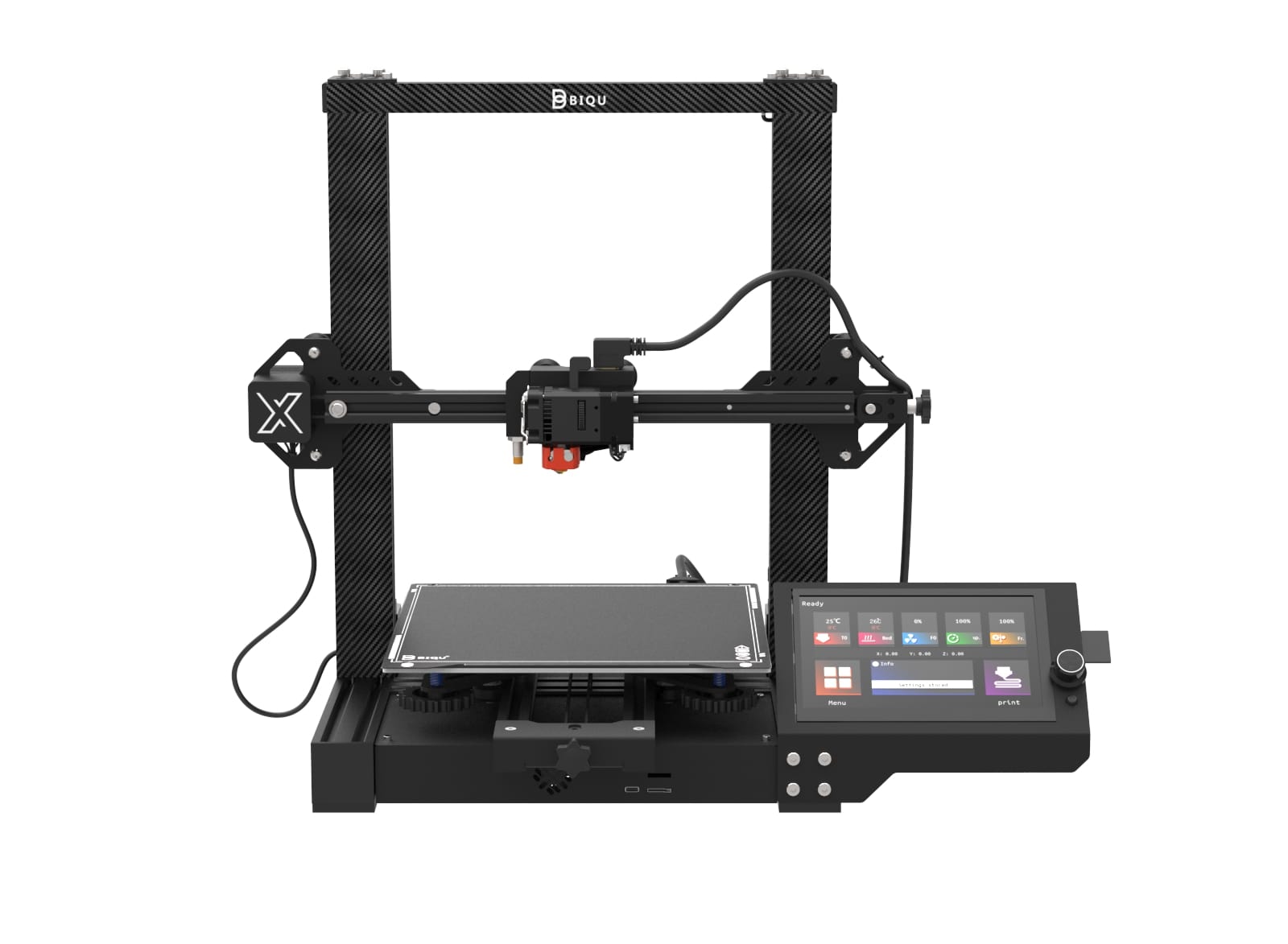
The powerful BIQU BX is not only suitable for beginners, even advanced users will definitely enjoy this innovative 3D printer.
Large build space | Lightweight direct drive extruder | Automatic levelling sensor
With a build volume of 250 x 250 x 250 mm, larger models can be created with the BIQU BX than, for example, with the Creality Ender 3 V2, which we have just been working on.
The BIQU BX also differs from the Creality printer in other features. The BX has an ultra-light direct drive extruder to which a fan and automatic levelling sensor are attached.
Due to its low weight and a gear ratio of 7: 1, the extruder achieves excellent printing performance. The maximum nozzle temperature of the BX is 260 ° C, the maximum heated bed temperature is 110 ° C.
One of the biggest advantages of the BIQU BX is the already mentioned automatic levelling sensor, which relieves someone of the tedious manual levelling of the print bed. Levelling is often a difficult process, especially at the beginning, which often leads to unusable prints.
Dual Z-axis | Smooth inner nozzle surface
The dual Z-axis structure and the carbon fibre-like aluminium profile guarantee robustness and stability. The 3D printer can also be assembled in less than 10 minutes.
A high-quality brass nozzle with a smooth inner nozzle surface of up to Ra0.4 ensures more precise feeding and removal of filament and effectively prevents clogging.
Touchscreen | Powerful CPU | Raspberry Pi | Octoprint
A 32-bit smart control card guarantees fast computing power and smart assistant functions such as automatic levelling.
The 7-inch touchscreen with 3 control modes can be operated in 15 languages. An ingenious BTT motherboard supports the plug & play firmware expansion of Raspberry Pi. Necessary parts and the connection board are well integrated for the integration of the Raspberry Pi and are compatible with RPi3 and RPi4.
The BIQU BX is also the first 3D printer with integrated Octoprint
Features of the BIQU BX at a glance
- 250 x 250 x 250 mm build space
- Direct drive extruder
- Single extruder
- Max. nozzle temperature: 270 ºC
- Max. Heated bed temperature: 140 ℃
- Quick assembly
- Very user friendly
- Dual Z-axis structure
- Automatic bed levelling
- 7 ”touchscreen
- 32-bit smart control card
- BTT motherboard
- Smooth inner nozzle surface
- Raspberry Pi integration
- Integrated octoprint
- USB & SD card interface
3. Artillery Sidewinder X1 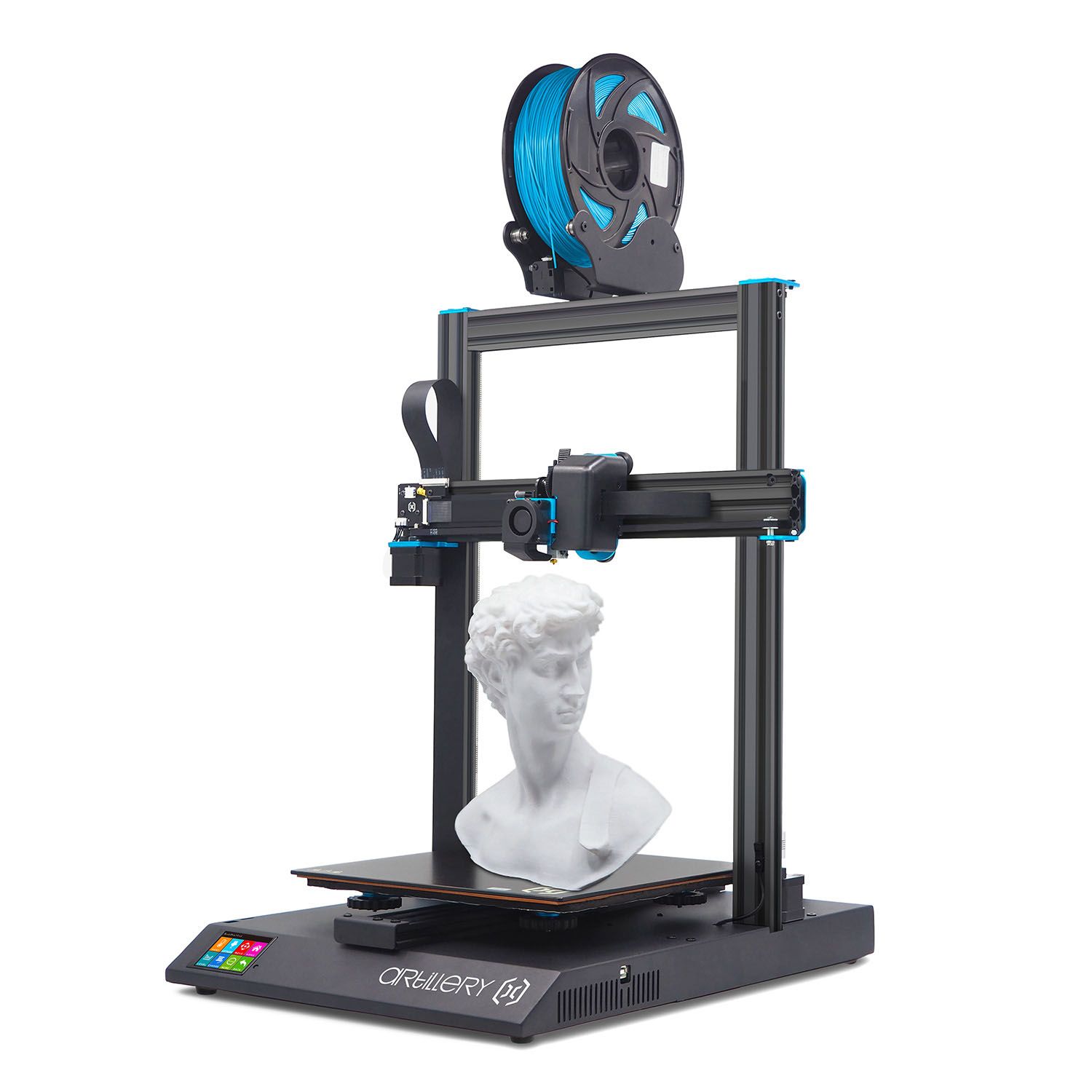
The Artillery Sidewinder X1 convinces with the largest build volume of our top 5. The large build space in combination with other great features and a low price make the 3D printer one of the most popular 3D printers on the market and a very good entry-level device.
Large build space | Fast heated bed | Dual Z-axis
The 300 x 300 x 400 mm build space of the Sidewinder X1 enables larger models to be printed. The air-permeable and ceramic-coated glass printing platform offers excellent adhesion and easy removal of the print as soon as the heating bed cools down.
The Sidewinder X1's heated bed makes other printers look old - it heats up from room temperature to 60 ° C in around 45 seconds. The maximum heated bed temperature is 130 ° C.
A dual Z-axis ensures synchronous movements and high printing precision.
Direct drive extruder
The Artillery Sidewinder X1 has a direct drive extruder with a maximum nozzle temperature of 260 ° C, which is also suitable for printing flexible filaments. This is an advantage over many other entry-level printers.
Would you like to know exactly what the difference is between a direct drive and a Bowden extruder? In our article “Direct-Drive-Extruder vs. Bowden-Extruder” you will find out all the advantages and disadvantages of both types of extruder.
Touchscreen | Filament sensor | Resume Print
You can always monitor and control the printing process on a 3.5-inch colour touchscreen. The user interface is easy to use, even for beginners. A filament sensor also shows you when the filament is running out.
Also great: if the filament runs out, the print bed remains heated so as not to endanger the printing and to continue with it later without any problems.
In the event of a power failure, printing can be resumed from where it was interrupted thanks to the Resume Print function.
Features of the Artillery Sidewinder X1 at a glance
- 300 x 300 x 400 mm build space
- Direct drive extruder (max. nozzle temperature 260 ° C)
- Rapidly heatable heated bed (max. 130 ° C)
- Dual Z-axis
- Pre-assembled
- Ceramic coated glass platform
- Resume print function
- Very quiet
- Easy use
- Colour touchscreen
- Fast assembly
- Filament sensor
- Interfaces: USB, SD card
4. Voxelab Aquila 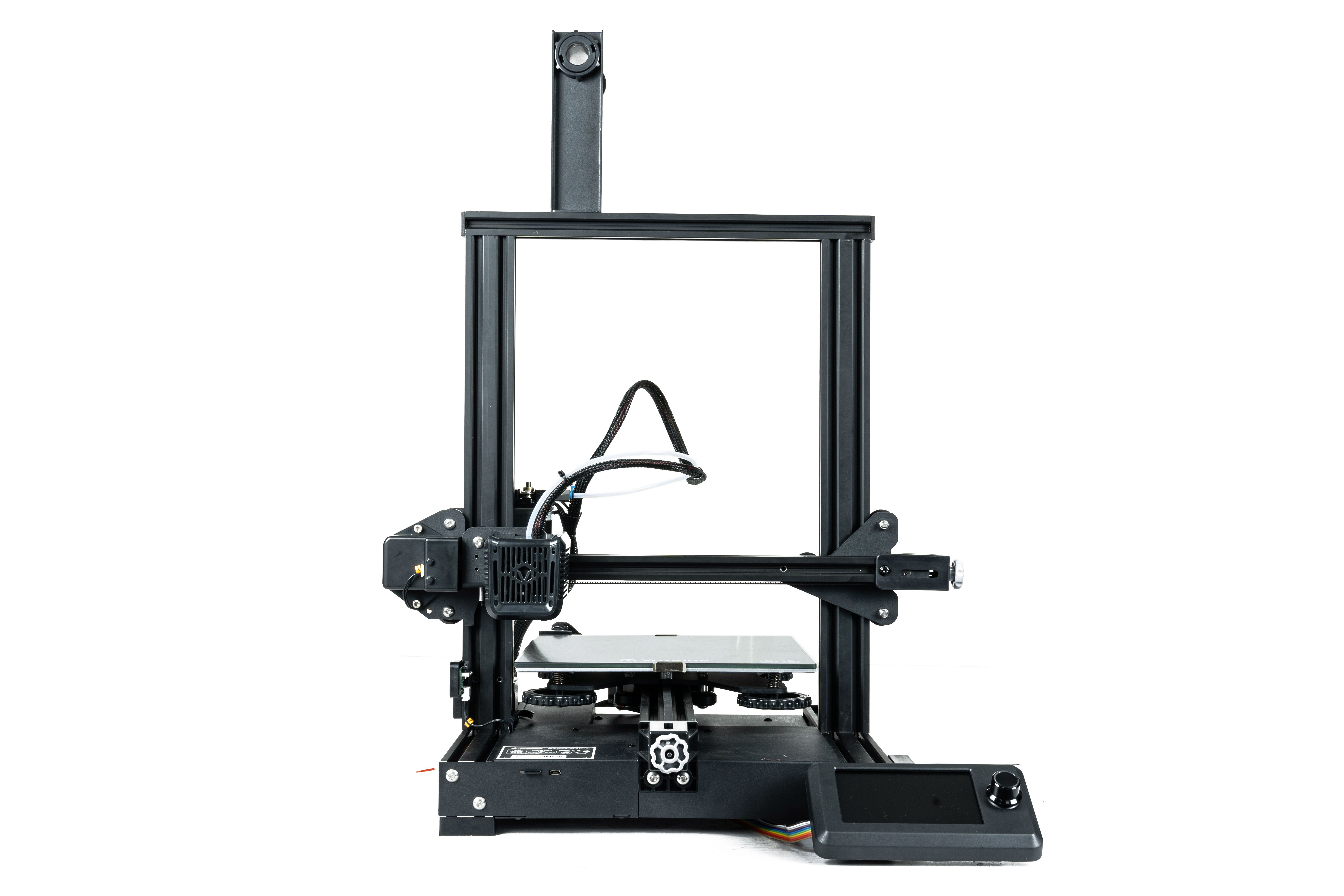
The Voxelab Aquila is a very inexpensive 3D printer that is ideal for beginners.
Despite its low price, the 3D printer is equipped with a relatively large build volume of 220 x 220 x 250 mm and has a robust all-metal frame.
Modular build | Structured design
The assembly and setup of the Voxelab Aquila is child's play. The 3D printer is delivered partially assembled, thanks to its modular structure it can be assembled quickly and you can learn more about the basic construction of the device during assembly.
The wiring harness is hidden, which avoids safety risks and simplifies maintenance.
Bowden extruder | Carbon crystal silicon glass plate
The Aquila 3D printer is equipped with a Bowden extruder, the maximum printing temperature is 250 ° C.
A carbon-crystal-silicon-glass plate guarantees excellent bed adhesion and minimises the risk of warping. The heated bed can be heated to 100 ° C (maximum temperature) in less than 5 minutes.
V-profile roller bearings
V-profile roller bearings ensure even and smooth movements, low noise development and high wear resistance.
Resume Print Function | Colour display
In the event of a power failure, the Voxelab Aquila switches to pause mode. Printing can then be resumed from where it was interrupted.
The 3D printer can be easily navigated using a rotary knob on a 3.5 ” colour display with an attractive user interface.
Features of the Voxelab Aquila at a glance
- Bowden extruder
- 220 x 220 x 250 mm build volume
- Modular build
- Large build volume
- All-metal frame
- 250 ° C max. Printing temperature
- 100 ° C max bed temperature
- Carbon crystal silicon glass plate
- Easy use
- 3.5 ”touchscreen
- Resume print function
5. Anycubic Mega Zero 2.0 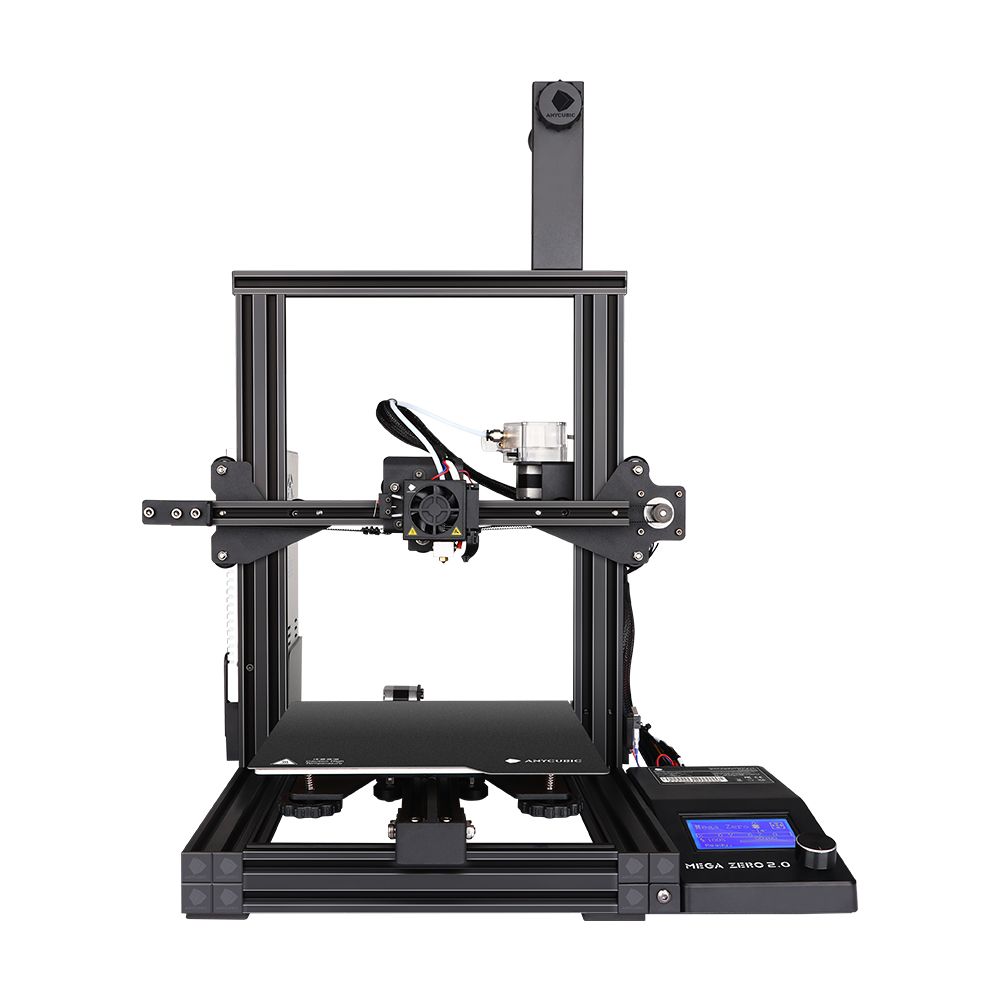
The Anycubic Mega Zero 2.0 is the revised successor to the Anycubic Mega Zero and the cheapest of our selected entry-level 3D printers.
Due to the modular structure of the device, the 3D printer is quickly and easily assembled and ready for use.
Magnetic print surface | Dual gear extruder
At 220 x 220 x 250 mm, the Mega Zero 2.0 retains the same build volume as its predecessor. In contrast to the Mega Zero, the Mega Zero 2.0 is equipped with a heatable print bed that can be heated up to 110 ° C. So you can not only be reassured when it comes to the print bed adhesion, more filament types can also be printed thanks to the heated print platform.
The filament is processed by a dual gear extruder, which has strong torque and thus enables gentle extrusion. The maximum printing temperature is 255 ° C.
The flexible magnetic print surface, which can be removed, is also practical. Thanks to the structured surface, it ensures good adhesion and easy detachment of the model after the printing process.
Resume print function
In the event of an unexpected power failure, printing can simply be resumed.
Features of the Anycubic Mega Zero 2.0 at a glance
- Bowden extruder
- Modular construction
- 220 x 220 x 250 mm build volume
- Heated bed up to 110 ° C
- Dual gear extruder
- Maximum printing temperature: 255 ° C
- Flexible magnetic printing plate
- Resume print function
Latest reviews
-
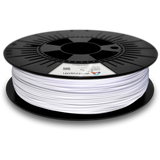 5.0 (4)
5.0 (4)AddNorth X-PLA White, 1.75 mm / 750 g
-10%- High impact resistance
- 100% biodegradable
- Unbeatable finish
€ 21,74 € 24,16 (€ 28,99 / kg)Delivery by July 25
-
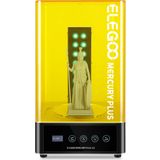 € 73,33 € 116,66
€ 73,33 € 116,66Delivery by July 25
-
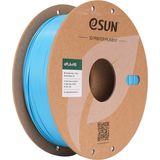 5.0 (1)
5.0 (1)eSUN ePLA+HS Space Blue, 1.75mm / 1000g
-10%- For high speed printing
- High adaptability
- Even flow behavior
€ 16,49 € 18,33 (€ 16,49 / kg)Delivery by September 02
-
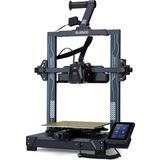 4.8 (32)
4.8 (32)Elegoo Neptune 4
-30%- ARM 64-bit high-performance mainboard
- Dual Gear Direct Drive Extruder
- Powerful cooling system
€ 158,33 € 224,99Delivery by July 25
Magazine Articles:
Discover 3DJake:
More than 9.800 products
We deliver worldwide to
more than 40 countriesSecure payments
with SLL encryption technology
